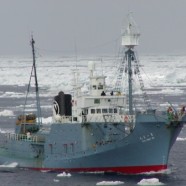Whales, Nagoya Blabla
The Conference on Biodiversity taking place in Nagoya Japan ends today while, in November, the Japanese whaling fleet will leave for Antarctica to catch 1,000 whales. Since 1986, when the moratorium on commercial whaling entered into force Japan has killed, in the name of science, 13,210 whales of which close to 10,000 were caught in Antarctica, a whale sanctuary since 1994. Considering the state of the Japanese whaling fleet, the entire Antarctic ecosystem is threatened by an oil spill.
The mother-ship, Nisshin Maru, ex Chikuzen Maru was launched in 1987. She was initially a stern trawler in American waters. She was quickly converted into a whaling factory ship. She works in the Antarctic Ocean without a double hull or reinforcement against ice and with only one engine. In February 2007, while the Nisshin Maru was sailing in the Ross Sea, a major explosion occurred aboard killing a crewmember and immobilising the vessel leaving her to drift for several days in the ice-infested Southern Seas. According to New Zealand authorities, the incident is one of the most serious to have occurred in the region. The Japanese did not immediately send out an SOS. The Nisshin Maru is also a little tanker with a capacity of holding 2,600 tons of fuel.
Whales are still out of sorts
Robin des Bois remains very sceptical about the evolution of the compromise on research at the heart of the IWC. A number of delegations and NGOs have made it their priority and deplored that in the convention’s actual state Japan, Iceland and Norway remain out of its’ control. Robin des Bois prefers this situation to that of the International Whaling Commission being controlled by Japan, Iceland and Norway.
Robin des Bois hopes that France and other European Nations unite with Australia when they bring their claim to the International court of Justice in The Hague, aiming at banning scientific whaling carried out by Japan in the Austral Ocean. In this way the Japanese whaling fleets’ next campaign in the Antarctic will be increasingly contested.
Phew! The Compromise went Plonk!
Arriving confident and ready to fight, promoters of the so called “compromise” document are today taking a low profile. Two days of “private meetings between commissioners” safe from the eyes and ears of NGOs proved fruitless. Japan, Norway, Island and Korea were successively heard by groups of 5 countries during thirty odd sessions over two days. The process was compared by some delegates to “speed dating”.
Now some countries feel, that they should start anew, others believe that they should take into account the documents on the agenda as basis for future work. The European Union prefers the latter. Formalities on how to move the discussion forward during this “new period of reflection” will be taken before the end of the debates.
Black Whales
Subjet : BP Oil Spill
The cumulated amount of oil in the ocean is estimated to range between a low bracket of 300,000 and high a high bracket of 500,000 tons. The Gulf of Mexico has a surface area of 1,500,000 km²; on May 2nd fishing was prohibited within a closed area of 17,000 km². Today, the no take zone extends to 225,000 km². The sale of potentially contaminated seafood must be forbidden to avoid any risk of poisoning Americans.
Yet, other mammals feed exclusively on seafood in the Gulf of Mexico and its adjacent seas. According to NOAA (National Oceanic and Atmospheric Administration), 29 species of marine mammals are present in the Gulf of Mexico. In “normal” conditions, they are exposed to the risk of collisions and to acoustic disturbances caused by maritime transport and the numerous offshore oil and gas platforms. Amongst marine mammals, the most vulnerable are the Manatees. Threatened with extinction, these pacific and slow moving sea cows are already victims of propellers from ships and recreational crafts. Manatees are extremely sensitive to oil spills and to the saturation of their preferred food : underwater meadows of sea grass.
Black Whales
Subjet : BP Oil Spill
The cumulated amount of oil in the ocean is estimated to range between a low bracket of 300,000 and high a high bracket of 500,000 tons. The Gulf of Mexico has a surface area of 1,500,000 km²; on May 2nd fishing was prohibited within a closed area of 17,000 km². Today, the no take zone extends to 225,000 km². The sale of potentially contaminated seafood must be forbidden to avoid any risk of poisoning Americans.
Yet, other mammals feed exclusively on seafood in the Gulf of Mexico and its adjacent seas. According to NOAA (National Oceanic and Atmospheric Administration), 29 species of marine mammals are present in the Gulf of Mexico. In “normal” conditions, they are exposed to the risk of collisions and to acoustic disturbances caused by maritime transport and the numerous offshore oil and gas platforms. Amongst marine mammals, the most vulnerable are the Manatees. Threatened with extinction, these pacific and slow moving sea cows are already victims of propellers from ships and recreational crafts. Manatees are extremely sensitive to oil spills and to the saturation of their preferred food : underwater meadows of sea grass.









